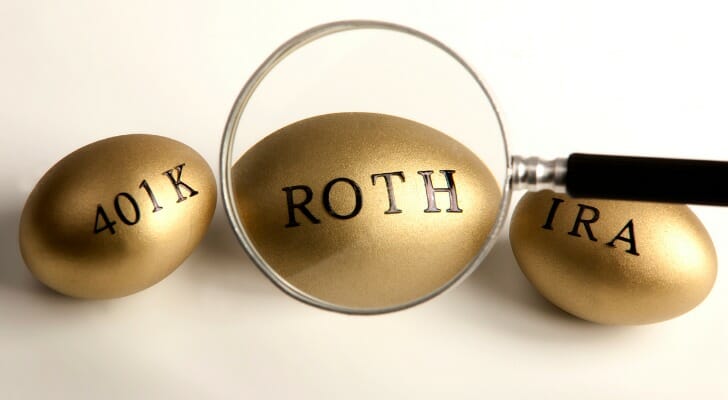Can You Roll a Regular 401k Into a Roth Ira

Rolling over your 401(k) plan to a Roth IRA is a taxable event. You'll have to pay income tax on your contributions, your employer-match contributions and all earnings. Depending on the size of your account, this could push you into a much higher tax bracket, so you shouldn't proceed before you've done the math. You may also want to consult a financial advisor to make sure this move is the right one for you.
Roll Over Your 401(k) to a Traditional IRA, Then Convert It to a Roth IRA
Contributions to your 401(k) plan were pre-tax. This means your employer deducted them from your taxable salary when reporting your income to the IRS. Same goes for any employer matches. So you have yet to pay taxes on any contributions – and on any accrued earnings.
Traditional IRAs are also tax-advantaged. The difference, of course, is that individuals rather than employers send their contributions to their financial institutions – and claim the deduction when filing their taxes. So like 401(k) balances, the money in an IRA is tax-deferred. You won't owe taxes on it until you retire and start taking distributions.
This is why rolling over your 401(k) to a traditional IRA is fairly straightforward. It's an apples-to-apples transaction.
By contrast, you fund a Roth IRA with after-tax dollars. That means you pay taxes on your contributions upfront. The tradeoff is that all earnings are tax-free. So when you retire and start making withdrawals, you will owe no taxes. Also, a Roth IRA doesn't have required minimum distributions (RMDs) like its traditional counterpart, so you can leave the money untouched indefinitely if you prefer.
No doubt, there are significant advantages to moving your 401(k) money to a Roth IRA. But, as noted earlier, it will be a taxable event. You will owe taxes not only on your contributions and your company's contributions if it has a matching program, but also on your earnings, which include capital gains and dividends. This bump in income could boost you to a much higher income bracket so that you are paying more tax than if you left the money in a traditional IRA and paid taxes as you made withdrawals in retirement.
Because the taxation of your money is changing, the switch from a traditional IRA to a Roth is called a conversion rather than a rollover. More importantly, it is a permanent process. So you should make sure this is what you really want to do before you do it.
Direct and Indirect 401(k) Rollovers

Before you roll over your 401(k), you'll need to open an IRA account. You can do this at virtually any major brokerage firm, mutual fund company or robo-advisor. Do some research, then head to your financial institution's website to open your account. At some point, you'll want to talk to a customer representative to find out whether the rollover and conversion can be done at once or if they are done sequentially. If it's the former case, you'll just have to pick your investments once. If it's the latter, you'll want to keep the money liquid in the IRA before converting to a Roth.
Once you've opened the IRA, you can contact the company managing your 401(k) account to begin the rollover process. You can do this online or over the phone. Your 401(k) plan administrator will then transfer your funds into your new IRA account. This is called a trustee-to-trustee or direct rollover, and it's the easiest way to do it.
Another path is an indirect rollover. In this case, the balance of the account is distributed directly to you, typically as a check. You'll have 60 days from the date you receive the funds to transfer the money to your custodian or IRA company. If you don't deposit the funds within the 60 days, the IRS will treat it as a taxable withdrawal, and you'll face a 10% penalty if you're younger than 59.5. This risk is why most people choose the direct option.
With either rollover option, you'll also have to make sure you've satisfied any special requirements the company might have. If you're looking to roll over only a portion of your 401(k), you'll need to check with your plan administrator to see if that's something they allow.
Paying Taxes on Your Contributions
The point of a Roth IRA is that the money gets taxed as income upfront, then grows tax-free. But the money in your 401(k) was shielded from taxes. So you'll now need to pay income tax on that money so that it qualifies for a Roth.
The funds you roll over are added to your taxable income for the year you do the rollover. Income taxes you owe will be calculated from that new total. Since the "income" from your IRA isn't coming from a paycheck, though, the tax you owe on it won't be withheld. It'll have to come out of your pocket, and to avoid a penalty, you may need to make an estimated tax payment before filing your taxes for the year.
You'll need to make an estimated tax payment if the taxes withheld from your paycheck aren't enough to cover at least a) 90% of the taxes you'll owe for the tax year of your rollover or b) 100% of the taxes you paid for the previous tax year (the smaller of the two figures). Once you know your estimated payment, you can either pay it all at once or split the amount between the quarters remaining in the tax year. Quarterly estimated tax payments are due on or before April 15, June 15, Sept. 15 and Jan. 15 of the next year.
If you overestimate how much your tax bill is going up and overpay your estimated tax payments, that's OK. You'll get a refund if you end up paying more than you owe.
If you're converting a large balance to a Roth, your tax bill for the year could go up substantially. That's especially true if the extra "income" pushes you into a higher tax bracket. To lower this impact, you could convert only part of the traditional IRA over two or more years. By spreading out your conversion, you avoid having a huge tax bill to pay all at once, and perhaps keep yourself in a lower bracket.
Roth 401(k)s as an Alternative

A Roth 401(k) combines the employer-sponsored nature of the traditional 401(k) with the tax structure of the Roth IRA. If your employer offers this type of plan, you'll contribute after-tax money to your account – and you won't owe taxes when you start receiving distributions. If your employer offers a match, though, that money is in a traditional 401(k) plan. So if you choose to convert it, you will owe taxes on it the year you do so.
If you're looking to do a rollover from a Roth 401(k) to a Roth IRA (minus any company match), the process is quite simple. All you'll have to do is follow the same steps as if you were rolling over a traditional 401(k) to a traditional IRA. The tax structure is staying the same. If you're looking to convert your Roth 401(k) into a traditional IRA, you're out of luck. Unfortunately, this isn't possible, since you can't un-pay taxes on the money in your Roth 401(k).
Bottom Line
The tax status of your retirement accounts can have quite a large effect on how your finances will look when you retire. Although rolling over a pre-tax 401(k) to a Roth IRA is a little unconventional, it could be the right move for some people. However, be sure you take care of all the tax requirements that come with this decision. If not, you could get hit hard by IRS penalties.
Tips for Saving for Retirement
- Having trouble figuring out how taxes fit into your retirement plan? It may be smart to work with a financial advisor on such decisions. Finding a qualified financial advisor doesn't have to be hard. SmartAsset's free tool matches you with up to three financial advisors in your area, and you can interview your advisor matches at no cost to decide which one is right for you. If you're ready to find an advisor who can help you achieve your financial goals, get started now.
- As you plan for your retirement income, you should also consider how Social Security benefits fit into the equation. Our Social Security calculator can help in this regard. Fill in your age, income and target retirement date and we'll calculate what you can expect in annual benefits.
Photo Credit: ©iStock.com/jygallery, ©iStock.com/Peopleimages, ©iStock.com/AndreyPopov
Hunter Kuffel, CEPF® Hunter Kuffel is a personal finance writer with expertise in savings, retirement and investing. Hunter is a Certified Educator in Personal Finance® (CEPF®) and a member of the Society for Advancing Business Editing and Writing. He graduated from the University of Notre Dame and currently lives in New York City.
Can You Roll a Regular 401k Into a Roth Ira
Source: https://smartasset.com/retirement/rollover-401k-to-roth-ira
0 Response to "Can You Roll a Regular 401k Into a Roth Ira"
Post a Comment